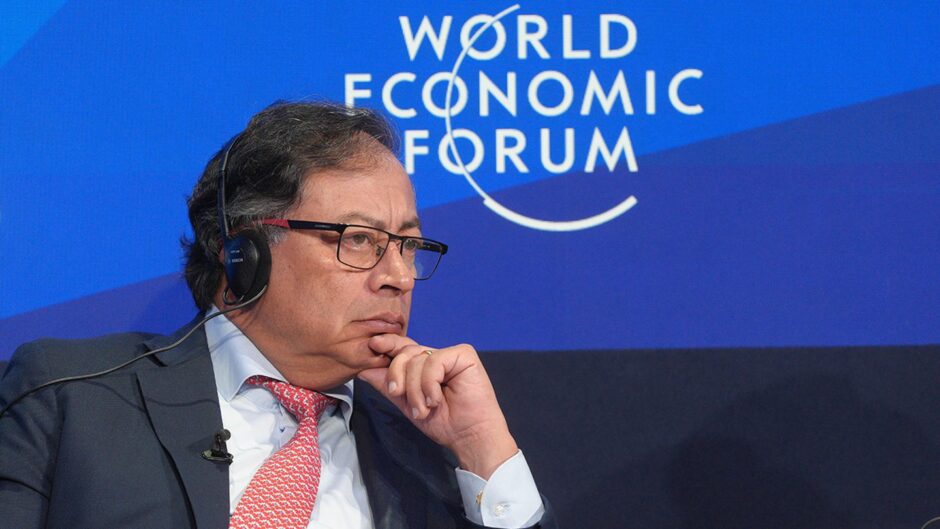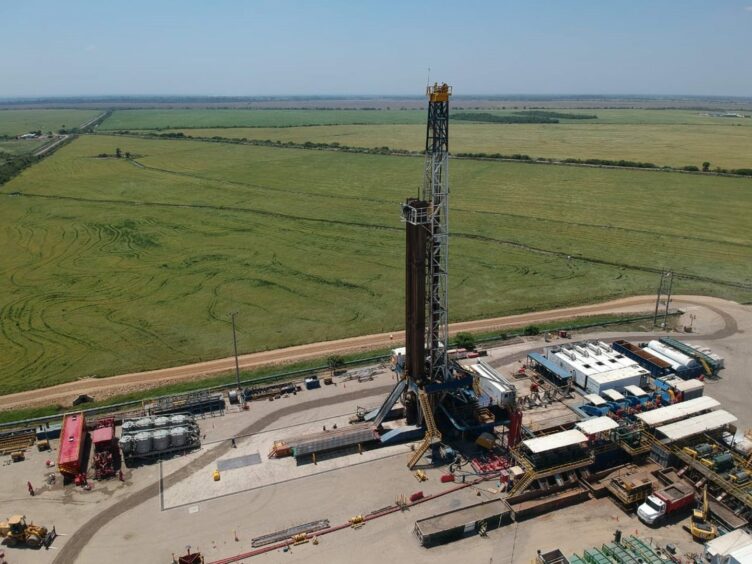
Colombian President Gustavo Petro has reaffirmed a shift for the country, with an increased focus on decarbonisation and away from oil and coal. However, companies remain confident in their drilling plans – at least for now.
The oil industry accounts for 10% of GDP and 20% of exports. Petro called for the world to ascribe value to Colombia’s rainforests, he said, speaking at the World Economic Forum (WEF). He also said the country would replace foreign exchange earnings from coal and oil with increased tourist revenues.
Speaking at Davos yesterday, Petro said Colombia called for a move from discussion to action. There is a need for “profound political changes, transformations of society and its conception. Colombia, for example, has decided not to contract more oil, gas and coal exploration.”
The climate crisis is the “mother of all problems”. There is an alternative way of living, Petro said.
Rethinking finance
The Amazon rainforest requires $2.5 billion per year to tackle deforestation. A statement from the presidency said this required a move away from the idea of aid, and towards swapping public debt for climate action.
The president said there was a need for change to the financial system globally, in order to be able to tackle climate change.
“It is not alms, it is a powerful financing mechanism for climate action that on a universal scale implies a change in the global financial system. “Brazil proposed to us in exchange for our proposal, which is to issue special drawing rights in the [International Monetary Fund],” he said.
Petro said North America was a “huge CO2 chimney” while the south partially absorbed this. “The Amazon rainforest is worth more than the oil that is in there. That’s life. Oil is death. It’s that simple.”
North America must reduce its emissions, he continued, and financing must shift to support climate action.
Colombia joined the Beyond Oil and Gas Alliance (BOGA) as a “friend” last year. The campaign said it would provide $1 million in funding to Kenya and Colombia at COP28 to drive a “just transition” away from oil and gas. Spain and Samoa also joined BOGA at COP28.
Ecopetrol
Ecopetrol, Colombia’s state-backed oil company, reported production of 741,000 barrels of oil equivalent per day in November, up 20% year on year. The company made five onshore discoveries in the third quarter and the offshore Glaucus-1 gas find.
Wood Mackenzie has warned Colombia will run short of gas by 2030. Developing its offshore resources appears like an attractive option – and one that Ecopetrol is keen to exploit.
In December, the company said it would spend $5.8-6.8bn in 2024. Of this, it will invest around 40% in energy transition strategies, including gas supplies and infrastructure under this.
It aims to drill 360 development wells this year, with 74% in Colombia – with the rest in the US’ Permian Basin. Ecopetrol will also drill 15 exploration wells this year, in northern Colombia and offshore in the Caribbean.
The state-backed company will focus its gas spending on the Piedemonte Llanero and the Caribbean offshore. It aims to produce 772 million cubic feet per day of natural gas.
Ecopetrol aims to achieve net zero by 2050. It aims to reduce emissions by 1mn tonnes of CO2e by 2026 and cut 25% by 2030, from 2019 scope 1 and 2 baselines.
Industry impact
Colombia’s USO union warned in October about the impact of political plans on Ecopetrol. Cutting exploration spending, it warned, would run down reserves and have an impact on exports. Such a move “increases the risk of shortages and violates national energy security”.
The USO called for Ecopetrol to reveal the “true motivation” behind its transition plans, warning that more than 100,000 jobs depend on the industry.
One company working in the country is Parex Resources. A presentation this week from the Canadian-listed independent shows little sign of concern over Colombia’s planned move away from exploration.
Parex plans to produce 54,000-60,000 boepd this year, with capital expenditure of $390-430mn. It sees production rising to around 65,000 boepd by 2026, with three major exploration wells due this year.
Reuters reported recently that Colombia had picked Parex to work on the country’s first geothermal power project, at one of its oilfield sites.
Arrow Exploration is another company working in the country, with plans to spend $45mn this year, a notable increase from 2023.
A note from S&P Global’s Renata Machado in December noted Colombia was unlikely to return to licensing. She noted, though, that concerns of lower revenues and a squeeze on energy supplies “has already led his government to implement some measures to encourage exploration and maintain production in blocks under contract”.
Colombia held licence rounds in 2019 and 2021. For now, there is little impact on companies operating in the country as there seems to be no shortage of licensed areas with exploration opportunities. This applies both to the onshore and the offshore, where Petrobras recently signed up a rig to work amid discussion of “exciting prospects”.
Recommended for you


 © Supplied by Arrow Exploration
© Supplied by Arrow Exploration